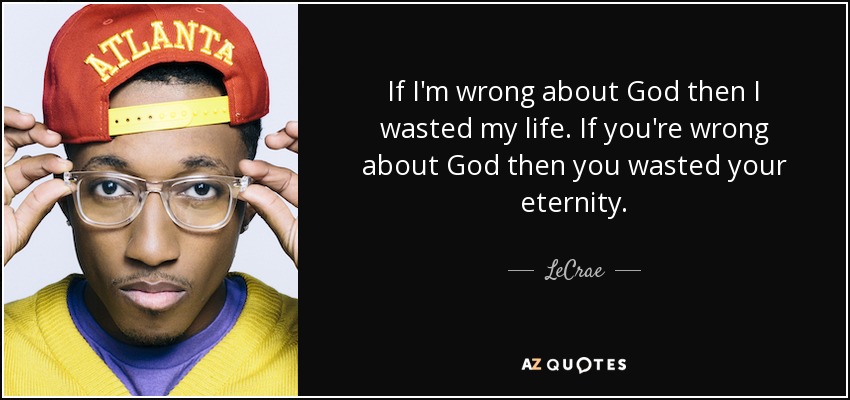Post by creature386 on Apr 14, 2016 23:54:41 GMT 5
I can't imagine that we don't have a thread about this one yet. It may not be the most logically sound case for God's existence (but to be fair, it isn't intended to be one), but it is a damn effective evangelist tactic (particularly common in "Fire and Brimstone evangelism").
The argument in a nutshell:
1. If God does not exist and I do not believe in him, it doesn't matter.
2. If God does not exist and I believe in him, it doesn't matter.
3. If God does exist and I do not believe in him, I have an eternal loss.
4. If God does exist and I believe in him, I have an eternal gain.
The argument in a nutshell:
1. Due to the possibility of God's existence, the most reasonable position is the one with the greatest likelihood of gains.
2. Believing that God exists is associated with the greatest likelihood of gains.
3. Therefore, it is most reasonable to believe in God's existence.
Or for those who have an allergy against syllogisms, the rapper Lecrae put it more simply:

Apart from evangelism, Pascal's wager is also a nice tactic to shift the burden of proof.
Consider the following conversation:
"Prove that God exists."
"Prove he doesn't."
"Prove that fairies don't exist."
"Irrelevant, the question if fairies exist has no bearing on your well-being, the question if God exists or not has enormous consequences and thus you should better be sure that he doesn't exist. Otherwise, this will have horrible consequences for you."
As Vodmeister usually does with apologist arguments, I only lay it out, I do not comment on it and it is up to you guys to discuss it.
One thing I would like to add to the discussion are the costs of faith, as apologists are divided on that subject:
-Lecrae thinks faith has costs.
-Blaise Pascal thought it has no costs nor benefits.
-Ray Comfort (who REALLY loves Pascal's wager) believes that the gains of faith outweigh the costs even if God does not exist because theists are generally happier than atheists (as far as I know, there are in fact studies confirming that).
The argument in a nutshell:
1. If God does not exist and I do not believe in him, it doesn't matter.
2. If God does not exist and I believe in him, it doesn't matter.
3. If God does exist and I do not believe in him, I have an eternal loss.
4. If God does exist and I believe in him, I have an eternal gain.
The argument in a nutshell:
1. Due to the possibility of God's existence, the most reasonable position is the one with the greatest likelihood of gains.
2. Believing that God exists is associated with the greatest likelihood of gains.
3. Therefore, it is most reasonable to believe in God's existence.
Or for those who have an allergy against syllogisms, the rapper Lecrae put it more simply:

Apart from evangelism, Pascal's wager is also a nice tactic to shift the burden of proof.
Consider the following conversation:
"Prove that God exists."
"Prove he doesn't."
"Prove that fairies don't exist."
"Irrelevant, the question if fairies exist has no bearing on your well-being, the question if God exists or not has enormous consequences and thus you should better be sure that he doesn't exist. Otherwise, this will have horrible consequences for you."
As Vodmeister usually does with apologist arguments, I only lay it out, I do not comment on it and it is up to you guys to discuss it.
One thing I would like to add to the discussion are the costs of faith, as apologists are divided on that subject:
-Lecrae thinks faith has costs.
-Blaise Pascal thought it has no costs nor benefits.
-Ray Comfort (who REALLY loves Pascal's wager) believes that the gains of faith outweigh the costs even if God does not exist because theists are generally happier than atheists (as far as I know, there are in fact studies confirming that).






 ) and that all other religions/possibilities are not even worth consideration.
) and that all other religions/possibilities are not even worth consideration.
